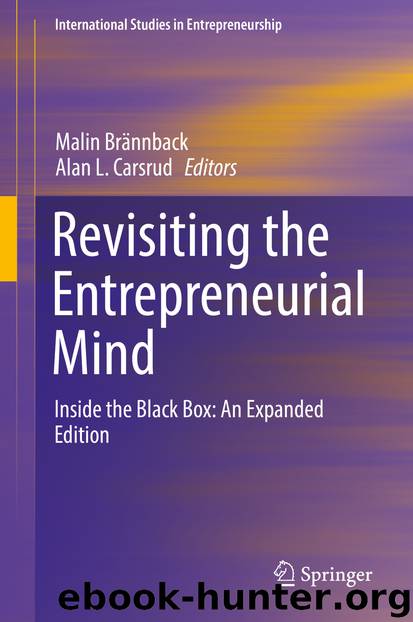Revisiting the Entrepreneurial Mind by Malin Brännback & Alan L. Carsrud

Author:Malin Brännback & Alan L. Carsrud
Language: eng
Format: epub
Publisher: Springer International Publishing, Cham
15.3.5 The Interaction Between Emotions and Cognitions in Entrepreneurial Decision-Making Processes
According to Scherer (2005) some researchers still see emotions and cognitions as two independent but interacting phenomena. However, there is more and more common sense that emotions and cognitions cannot be studied separated from each other, but that only an integrative view will lead to an understanding of their effects on entrepreneurial decision-making. Cognitive science research has proven a strong and complex link between emotions and cognitions (Baron 2008; Tice et al. 2000) and the expanding entrepreneurship literature (e.g., Koellinger et al. 2007; Lee et al. 2005; Shepherd 2004; Sternberg et al. 2007) provides also clear evidence that emotions have a systematic influence on entrepreneurial decision-making. In the last two centuries, three integrative fields of research aroused: the study of the influence of emotions on the memory, on cognitive information processing and attention, and on decision-making (Baron 2008).
The mood-dependent memory is therefore a study subject for the interaction of emotions and cognitions as it perceives, stores, and recalls certain information only in certain moods (Baron 2008; Blaney 1986; Bower 1981; Eich et al. 1994). Individuals primarily remember things they learned in a certain mood when they are in a similar affective state again. For example, entrepreneurs remember sad things when they are in a similar sad situation, and they remember happy things when they are in a similar happy situation. Additionally, if entrepreneurs in negative (positive) moods remember more negative (positive) situations, the current negative (positive) emotional state will be enhanced and entrepreneurs will feel even worse (better). This influences entrepreneurs’ decision-making as they only recall selected mood-dependent information on which the decision is based.
As mentioned above, strong positive emotions will result in cognitive strategies for coping and tolerating high levels of stress (Baron 2008; Carver and Scheier 2001). While individuals under weak stress are more concentrated and motivated in their tasks, individuals under strong stress might not be able to “think” anymore—a so-called “black out”—and are unable to explain the simplest relationships. In addition to the influence of the emotions’ intensity on cognitions, there are also indications that the quality of emotions determines how information is processed and stored (Baron 2008).
Emotions also have been found to influence individuals’ perceptions of the external world (e.g., Baron 2008; Forgas 1995, 2000), e.g., objects, experiences, people, whereas individuals displaying positive emotions tend to perceive the external world as positive and individuals displaying negative emotions tend to perceive the opposite (Baron 2008). For example, happy entrepreneurs tend to see their situation as positive (what it is not necessarily), whereas sad entrepreneurs tend to see their situation negative. In line with that, entrepreneurs with positive emotions tend to perceive a broader range of stimuli than entrepreneurs with negative emotions (e.g., Isen 2002; Schiffman 2005). Thus, positive emotions enhance individuals’ entrepreneurial alertness (e.g., Baron 2008). Positive emotions were also found to enhance creativity (creative cognition) (cf. Isen 1999), an important aspect of entrepreneurial cognitions, as happy individuals show a higher cognitive flexibility, i.e., a wider range of ideas and associations (e.
Download
This site does not store any files on its server. We only index and link to content provided by other sites. Please contact the content providers to delete copyright contents if any and email us, we'll remove relevant links or contents immediately.
Hit Refresh by Satya Nadella(9134)
The Compound Effect by Darren Hardy(8967)
Change Your Questions, Change Your Life by Marilee Adams(7781)
Nudge - Improving Decisions about Health, Wealth, and Happiness by Thaler Sunstein(7706)
The Black Swan by Nassim Nicholas Taleb(7129)
Deep Work by Cal Newport(7083)
Rich Dad Poor Dad by Robert T. Kiyosaki(6632)
Daring Greatly by Brene Brown(6513)
Principles: Life and Work by Ray Dalio(6448)
Playing to Win_ How Strategy Really Works by A.G. Lafley & Roger L. Martin(6306)
Man-made Catastrophes and Risk Information Concealment by Dmitry Chernov & Didier Sornette(6019)
Big Magic: Creative Living Beyond Fear by Elizabeth Gilbert(5771)
Digital Minimalism by Cal Newport;(5764)
The Myth of the Strong Leader by Archie Brown(5507)
The Slight Edge by Jeff Olson(5417)
Discipline Equals Freedom by Jocko Willink(5390)
The Motivation Myth by Jeff Haden(5212)
The Laws of Human Nature by Robert Greene(5208)
Stone's Rules by Roger Stone(5088)
